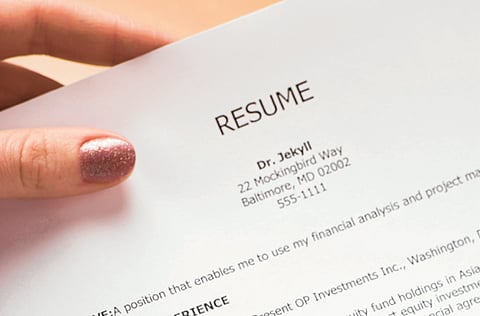A poor objective statement loses out
Detailing one's career goals and how a vacancy fits into those plans in the resume could create a bad impression for job seeker

Nothing can be a bigger turn off for a future employer than a resume that reads like a template that has been copied, pasted and modified. One item that can easily give this impression is the objective statement that many job seekers add near the top of their resume.
A poor objective statement that is forced or generalised to fit any job to be applied for, often loses its purpose and becomes a stumbling block that lengthens the resume unnecessarily and distracts a hiring manager from reaching the core of the job applicant's experience.
What defines poor here is the lack of a concise explanation of the candidate's career goals and how the position in question fits into those plans. It can be a result of the fact that the job doesn't actually contribute to any long-term plans or of the inability to draft a good statement. Either way, it is not wise to include an objective statement unless it won't hurt. After all, resumes are sent to unknown audience and no one can afford sending wrong signals at an early stage of the process.
However if you've your mind set on including it, here are a few points to consider:
What is the message?
Communicate your message is a concise and crystal-clear tone. An objective by nature has to tell a future employer why you're interested in a particular job opportunity and how you see it fit in your overall career plans. Since a general objective, as mentioned, won't serve this purpose, tailoring the statement based on the position is essential. However, do not jump into conclusions regarding advancement or wider responsibilities. You don't want to shoot yourself in the foot by telling an interviewer who might be your future supervisor that you're after his/her job. Additionally, an exaggerated objective may signal a misunderstanding on your end of what the job is all about or even reflect on your personality.
Quality control
Assuming you're applying for similar job opportunities, the modification process should become faster and you may end up having your own templates. However, when you're editing them for different applications, be sure of two points: your focus is on the particular area you're applying for and you're not rushing into making changes that introduce typos or grammatical errors into your resume.
Don't say a word!
If you sincerely think that your objective is to just have a job, any job, or to make a financial move, omitting the objective section completely is wiser. No one wants to hear that you're willing to abandon your current employer for money, or you are desperate for a job that pays the bills. You won't earn any points by stating your intentions or a stock objective that the employer may have read dozens of times.
Realistic goals
State your immediate goals rather than far-fetched dreams. While adding a long-term perspective can help, you need to stick to explaining the present move, and its relevance to the ultimate goal. Be ready to answer questions regarding your statement during the interview, so don't take it lightly and make sure you remain consistent and genuine throughout the process. An employer who thinks your plans are practical and possible might like to work with you on realising them.
Making a statement
Adding an objective statement to your resume is often an accessory. However, it can be particularly helpful if you're making a career change, re-entering the workforce after a break for childcare, or other reasons or taking a position that seems oddly below or above your qualifications. While I'd still recommend you include your explanation in a cover letter, having a brief note as an objective statement in your resume can help whoever your resume ends up with understand why you're interested in making an unusual move given your history.
Open rather than general
Watch out for limiting your own opportunities. You might be excluding yourself from other job openings if your statement seems to be inflexible. Yes, you need to express a solid plan but you have to make sure it is open enough to consider other possibilities and other employers. It is a fine line as you try not to be general, but if you are able to balance it, you may seem fully in charge and understanding of where you want to take your career.
Rania Oteify, a former Business Feature Editor with Gulf News, is currently a freelance journalist based in Salt Lake City, Utah.
Sign up for the Daily Briefing
Get the latest news and updates straight to your inbox


